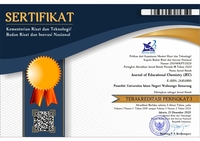The Influence of Science, Technology, Engineering, and Mathematics (STEM) Learning Models to Improve Students' Critical Thinking Skills
DOI:
https://doi.org/10.21580/jec.2023.5.2.18426Keywords:
critical thinking skills, redox, STEMAbstract
Low learning activity in science students causes a decrease in critical thinking skills. This can be seen from the results of learning redox material under the Kriteria Ketuntasan Minimal (KKM) of 75 in one of the high schools in Cirebon. Therefore, this study aims to improve students' critical thinking skills by using the Science, Technology, Engineering, and Mathematics (STEM) model for redox material in class X IPA MAN 1 Cirebon City. The research method used a Nonequivalent Control Group Design. Sampling was carried out by Purposive sampling consisting of class X IPA 5 as an experimental class and class X IPA 4 as a control class. The instruments used are critical thinking ability tests, observation sheets, and questionnaires. The selection of a sample based on the KKM of a class was revealed from discussions with a chemistry teacher. The development of the T-test obtained a sig value. 0.000 < 0.05 and an n-gain score of 0.71 with the highest category. The results showed improved critical thinking skills after being given STEM learning. Students respond very well to the teaching that has been done using the STEM model. Based on the results of the t-test and N-gain test, it can be concluded that the Science, Technology, Engineering, and Mathematics (STEM) learning model can improve students' critical thinking skills on redox material.
Downloads
References
Arini, N. R., Sabang, S. M., & Diah, A. W. M. 2021. Implementation of Guided Inquiry Learning Model on Colloid Systems to Improve Critical Thinking Ability of Students. Jurnal Akademika Kimia, 10(2), 87–92.
Ariyatun, A., & Octavianelis, D. F. 2020. Pengaruh Model Problem Based Learning Terintegrasi Stem Terhadap Kemampuan Berpikir Kritis Siswa. JEC: Journal of Educational Chemistry, 2(1), 33.
Ennis R H. 1991. A taxonomy of critical thinking dispositions and abilities In J B Baron & R. J. Sternberg Eds Series of books in psychology Teaching thinking skills: Theory and Practice. New York: Freeman.
Fujika, A., Anggereini, E., & Budiarti, R. S. 2015. Analisis Kemampuan Berpikir Kritis Siswa SMA N 5 Kota Jambi Melalui Pembelajaran Berbasis Masalah Pada Konsep Pencemaran Lingkungan. BIODIK, 1(1), 33-47.
Gazali, F., Yusmaita, E., & Ningsih, N. R. 2019. Pengembangan Modul Kimia Berbasis REACT untuk Meningkatkan Keterampilan Staf Pengajar Jurusan Kimia, FMIPA Universitas Negeri Padang. Jurnal Eksakta Pendidikan (JEP), 3(2), 142–151.
Hamidah, Leny, & Hamid, A. 2021. Analisis Berpikir Kritis dan Hasil Belajar pada Model Project Based Learning dengan Pendekatan Science, Technology, Engineering And Mathematics (STEM) Materi Sel Volta. JCAE (Journal of Chemistry And Education), 4(3), 101–107.
Khoiriyah, N., Abdurrahman, A., & Wahyudi, I. 2018. Implementasi Pendekatan Pembelajaran STEM untuk Meningkatkan Kemampuan Berpikir Kritis Siswa SMA pada Materi Gelombang Bunyi. Jurnal Riset Dan Kajian Pendidikan Fisika, 5(2), 53-62.
Khoirunnisa, F., & Sabekti, A. W. 2020. Profil Keterampilan Berpikir Kritis Siswa Pada Materi Ikatan Kimia. Jurnal Pendidikan Kimia Indoensia, 4(1), 26–31.
Lestari, D. A. B., Astuti, B., & Darsono, T. 2018. Implementasi LKS Dengan Pendekatan STEM (Science, Technology, Engineering, And Mathematics) Untuk Meningkatkan Kemampuan Berpikir Kritis Siswa. Jurnal Pendidikan Fisika Dan Teknologi, 4(2), 202–207.
OECD. 2009. Learning Mathematics for Life: A View Perspective from PISA. Diakses tanggal 29 November 2018 dari www.oecd.org
Pertiwi, W. J., Solfarina, & Langitasari, I. 2021. Pengembangan Lembar Kerja Peserta Didik (LKPD) Berbasis Etnosains pada Konsep Larutan Elektrolit dan Nonelektrolit. Jurnal Inovasi Pendidikan Kimia, 15(1), 2717–2730.
Pratiwi, Y., Redjeki, T., & Masykuri, M. 2014. Pelaksanaan Model Pembelajaran Problem Based Learning (PBL) Pada Materi Redoks Kelas X SMA Negeri 5 Surakarta Tahun Pelajaran 2013/2014. Jurnal Pendidikan Kimia Universitas Sebelas Maret, 3(3), 40–48.
Pusparini, S. T., Feronika, T., & Bahriah, E. S. 2018. Pengaruh Model Pembelajaran Problem Based Learning (PBL) Terhadap Kemampuan Berpikir Kritis Siswa pada Materi Sistem Koloid. JRPK: Jurnal Riset Pendidikan Kimia, 8(1), 35–42.
Rusminiati, N. N., Karyasa, I. W., & Suardana, I. N. 2015. Dibelajarkan dengan Model Pembelajaran Project Based Learning dan Discovery Learning. E- Journal Program Pascasarjana Universitas Pendidikan Ganesha Program Studi Pendidikan IPA, 5, 1–11.
Simatupang, H., Sianturi, A., & Alwardah, N. 2020. Pengembangan Lkpd Berbasis Pendekatan Science, Technology, Engineering, and Mathematics (STEM) Untuk Menumbuhkan Keterampilanberpikir Kritis Siswa. Jurnal Pelita Pendidikan, 7(4), 170–177.
Suriti, K. M. 2021. Penerapan Model Pembelajaran Berbasis STEM dalam Upaya Meningkatkan Hasil Belajar Kimia Siswa Kelas XI MIPA 4 SMA NEGERI 7 Denpasar Tahun Pelajaran 2019/2020. Widyadari, 22(1), 382–394.
Sutoyo, S., Azizah, U., & Allamin, S. 2019. Effectiveness of the Guided Inquiry Model Integrated with STEM to Improve the Student Critical Thinking Skills in Chemistry Learning. International Journal of Innovative Science and Research Technology, 4(12), 349–353.
Trnova, E., & Trna, J. 2015. Motivational Effectiveness of a Scenario in IBSE. Procedia-Social and Behavioral Sciences, 167, 184–189.
Wijayanti, R., & Siswanto, J. 2020. Profil Kemampuan Berpikir Kritis Siswa SMA pada Materi Sumber-sumber Energi. Jurnal Penelitian Pembelajaran Fisika, 11(1), 109–113.
Wisudawati, A. W. 2018. Science Technology Engineering and Mathematics (STEM) Education Approach against a Microscopic Representation Skill in Atom and Molecule Concept. International Journal of Chemistry Education Research, 2(1), 1–5
Downloads
Published
How to Cite
Issue
Section
License
The copyright of the received article shall be assigned to the journal as the publisher of the journal. The intended copyright includes the right to publish the article in various forms (including reprints). The journal maintains the publishing rights to the published articles.
Authors are permitted to disseminate published articles by sharing the link/DOI of the article at the journal. Authors are allowed to use their articles for any legal purposes deemed necessary without written permission from the journal with an acknowledgment of initial publication to this journal.

This work is licensed under a Creative Commons Attribution-NonCommercial-ShareAlike 4.0 International License.


